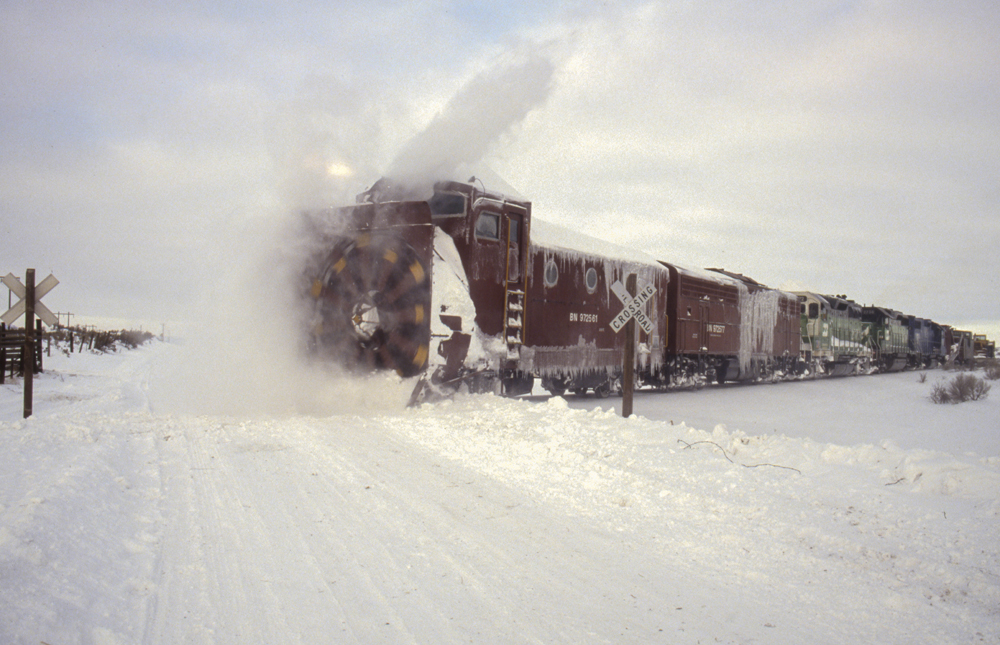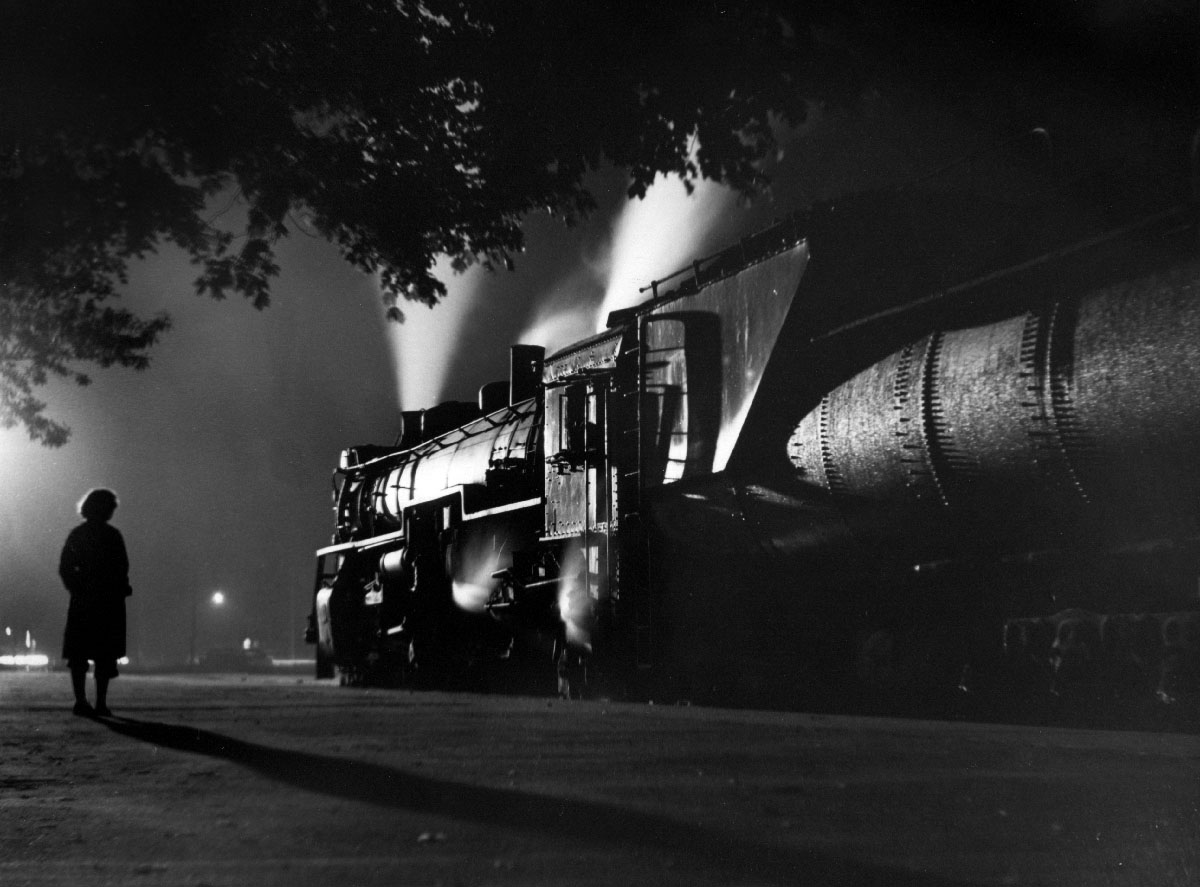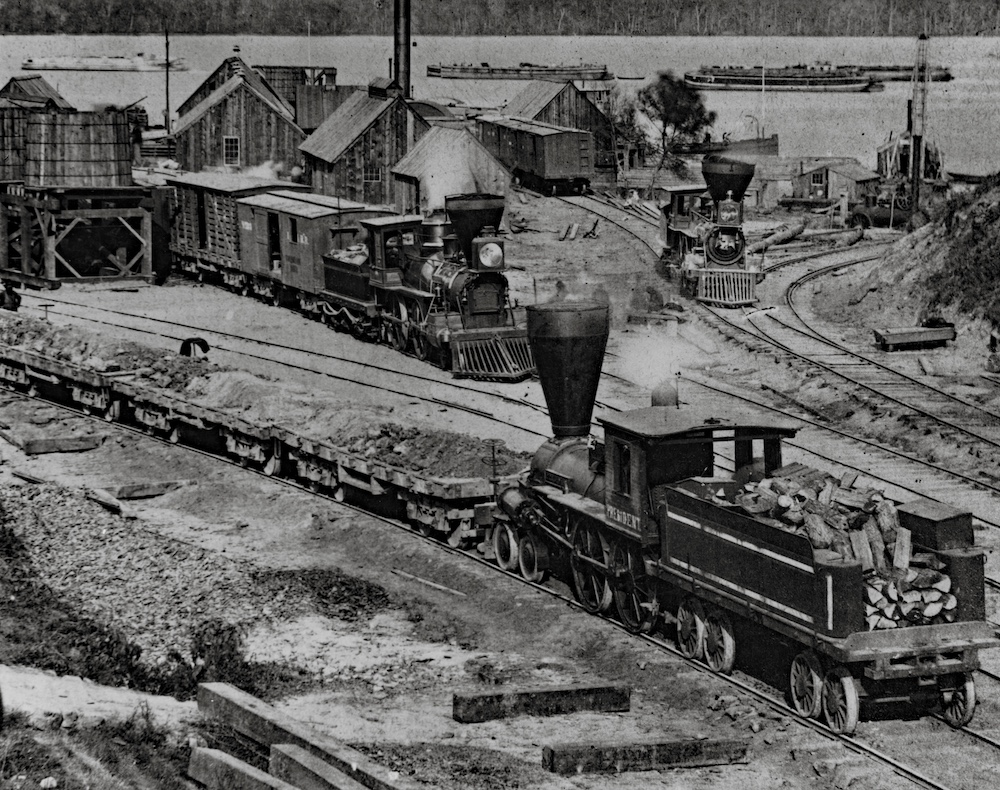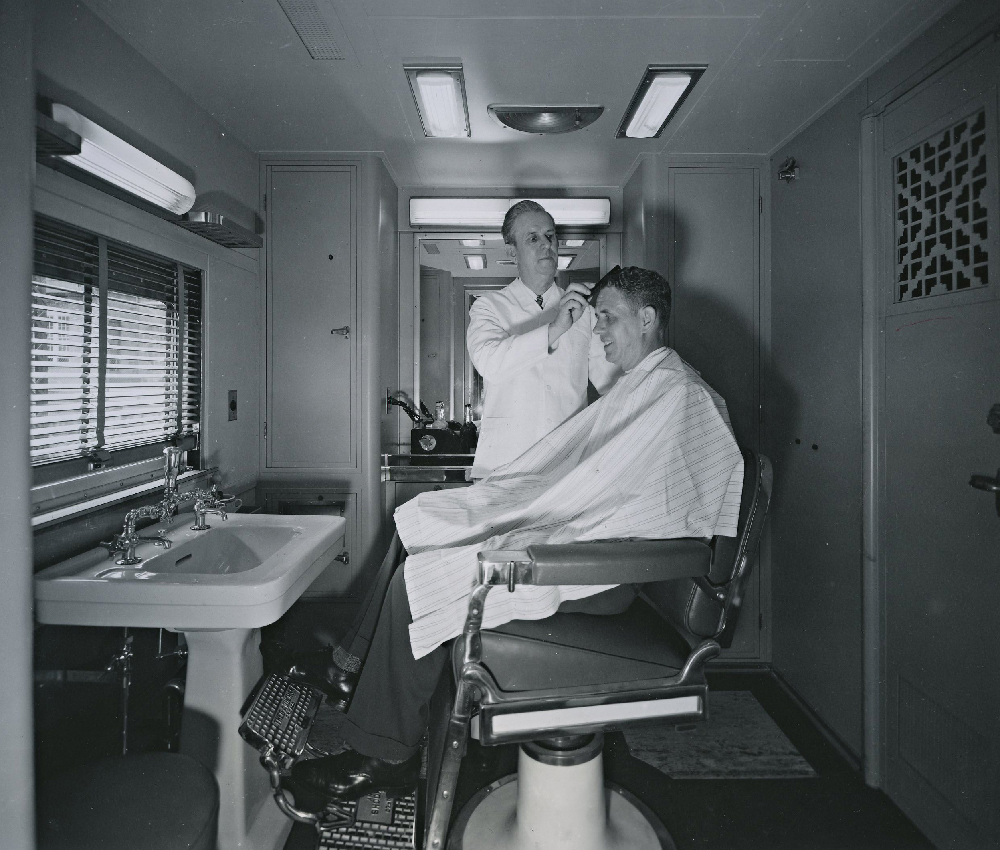Rotary snowplow

I missed my fair share of calls in my railroad career, but I only remember one with a specific date. That would be Jan. 12, 1993.
Only two times have I ever seen a rotary snowplow in action, both happened to be the same week in January of 1993 but on different railroads. The first was on the Camas Prairie Railroad based out of Lewistown, Idaho. I was over there with a handful of friends taking photos on Jan. 7. It was the second time Camas Prairie used the rotary that winter, so the local could service the Grangeville branch on the 8th.
Four days after the Camas Prairie trip, while working home to Seattle on a northbound freight, I got word that Burlington Northern had sent its rotary plow No. 972561 to Spokane to plow the Central Washington Branch from Cheney to Coulee City. The plow was normally stored at the former Great Northern Railway Interbay roundhouse, with this being its first use in 17 years.
The month of January is traditionally a slow time on the extra boards. When I went off duty, I was showing 22 times out on the engineer’s extra board at Interbay (Seattle). What could go wrong? I hurried home after work, packed my dinner, grabbed my cameras, threw more supplies in the truck, and headed to Wenatchee, where I overnighted at a local motel.
Sitting in my motel room I turned my railroad radio on, listening to the crew tie up to get a better idea of their location for the next morning. The rotary plow had been able to work west to Almira from Cheney on the first day. The next morning, I headed east on Highway 2 until I intercepted the plow between Almira and Hartline.
A converted covered wagon B-unit, BN No. 972561, provided power to the plow wheel while the road units pushed from behind. What I thought was interesting at the time is that in addition to the rotary and road power, BN also had a Jordan Spreader and a caboose full of maintenance-of-way workers with shovels if all else failed. On the rear were two flatcars with additional equipment and a front-end loader facing east. Burlington Northern was not taking any chances.
There are spots where Highway 2 and the tracks of the branch parallel each other. While following the plow on one of these stretches, I was driving to get ahead and passed a Washington State Highway plow working in the opposite direction. When I caught up with the railroad plow, they had the snow chute facing the highway, putting fresh snow back on the road that the State Highway Department just plowed. I drove through the cascading snow from the rotary, not my brightest idea. In all fairness, no one on the crew had ever worked a rotary before. Classic case of “on-the-job” training for both of us. Glad I did not break my windshield.
The plow crew noticed my predicament and stopped to turn the chute away from the highway. When I noticed they had stopped; I did a U-turn. As I pulled up next to the plow, I promptly dropped myself into a ditch.
While I was getting help with digging the truck out, my pager buzzes (who remembers pagers?). It was a 2-hour call to allow those of us that lived outside Seattle to make it to work on time. I lived in Puyallup, so it was about 41 miles to Interbay. I was at least 4.5 hours away from home and wasn’t expecting a call, so there was not much I could do about it. I just kept taking pictures.
A couple of hours later I found a pay phone next to a small store along the highway. So, I called the crew desk at Balmer Yard; the crew caller was an old friend and knew me from my early days, since both of us worked at Auburn Yard.
Doug said, “You missed a call for the Boeing switch.”
You were assigned to an outside terminal (Everett in this case) for seven days unless released from the job before the seventh day. A more senior engineer could bump on the job if it was a known vacation vacancy; otherwise you could stay on the job if you didn’t ask for a release on the seventh day. I would try to stay on the job when the boards were slow.
Doug asked if I would be able to fill the Job the next day,
I replied, “Yes, I’ll be there.”
Doug said, “I’ll let the engineer who filled the job know he’s released on tie-up and that you’ll fill the rest of the week.”
Doug chuckled and then said, “You’re over shooting that rotary snowplow, aren’t you?”
My reply was, “Yup.”
The call was worth missing.














I would spend time working on the layout of the local model railroad club while waiting for a call. Every hour I would go out to a pay phone to check in with the crew caller.
I had a VW bus at my away from home terminal which was close enough that I could drive home if it looked like I would not get called for a while. When I stayed over for a shorter time I would cut firewood along the right of way. There was a way to get an outside phone line on the block phones along the tracks. I would use that feature to check in with the caller when I was getting close to being called.
When I was at a friend’s home, I would give the caller that phone number. His wife would get annoyed if she was on the phone and the operator broke in saying that there was an emergency call for me. The phone company stopped doing that when pagers became common.
Yeah, been there done all that myself. oh, what fun, I used to tell dates they were 2nd out. LOL
Ah, yes… pagers were our first taste of freedom from babysitting the telephone at home.
While on the engineer’s extra board one morning, I called the crew caller to check the line-up. (No home computers back then) Fred Graham told me that there were no vacancies and I was third out. I told Fred that I was going to an antiques festival with my family and I would check back with him later.
So I go to the festival about 40 minutes away from home. (Home was about 20 minutes from the railroad and we were allowed a one-hour call)
As soon as we entered the festival grounds, I told my wife that I was going to the pay phone to check in with Fred.
When Fred answered, he said, “How soon can you get here”. I told him that I was on my way but I might be a little late. Fred said that he would tell the conductor and hold the call for me.
I went to tell my wife that I was ordered to work and other friends who had also gone to the festival volunteered to take her home after the event.
I rushed home in my 1980 Chevette, got my grip and work clothes and headed to the railroad. I arrived nearly 30 minutes tardy of call time but the train, a main-line run-through, was still 20 minutes away. Fred trusted me and I didn’t delay the train.
I love these kind of personal stories. That is why I subscribed to Trains and Classic Trains. I can do without the model stuff although I do have my own set-up. I just don get the same stories that I do from these kinds of moments in times. I have watched the video, “Rotaries; Avalanche on the Mountains” which is a true event of UP Breaking out the rotaries back in the 80’s in Roseville, CA to keep Donner Pass open, It was the first time in several years and the preparation, the history by the old timers, the equipment, the weather reports by “Mr. Pechner” and all the live shots outside and inside the rotaries and the problems they faced with new people was just tremendous. That’s what railroading is to me… Man and machine vs the elements, whether steam or diesel, the battle that still goes on every day around the country and around the world. Roll on steel wheels…
Sorry, meant to say the video was in the 90’s…